
Someday My Prince Will Come is the seventh studio album by Miles Davis for Columbia Records, catalogue CL 1656 and CS 8456 in stereo, released in 1961. Recorded at Columbia's 30th Street Studio in Manhattan, New York City, it marked the only Miles Davis Quintet studio recording session to feature saxophonist Hank Mobley.

Theodore Marcus "Teddy" Edwards was an American jazz tenor saxophonist.
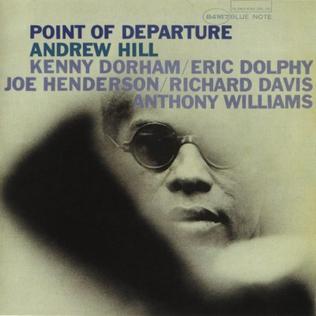
Point of Departure is a studio album by American jazz pianist and composer Andrew Hill, recorded in 1964 and released in 1965 on the Blue Note label. It features Hill in a sextet with alto saxophonist Eric Dolphy, tenor saxophonist Joe Henderson, trumpeter Kenny Dorham, bassist Richard Davis and drummer Tony Williams.
Frank Wright was an American free jazz musician, known for his frantic style of playing the tenor saxophone. Critics often compare his music to that of Albert Ayler, although Wright "offers his honks and squawks with a phraseology derived from the slower, earthier funk of R&B and gospel music." According to AllMusic biographer Chris Kelsey, Wright "never recorded even a single record under his own name for a major label; he was 'underground' his entire career." In addition to tenor saxophone, Wright also played the soprano saxophone and bass clarinet.
Muhammad Ali is an American free jazz drummer.

Cosmic Music is a jazz album by John Coltrane and Alice Coltrane released after John Coltrane's death. John Coltrane only plays on two tracks, "Manifestation" and "Reverend King".

Noah Howard was an American free jazz alto saxophonist.

Bobby Few was an American jazz pianist and vocalist.
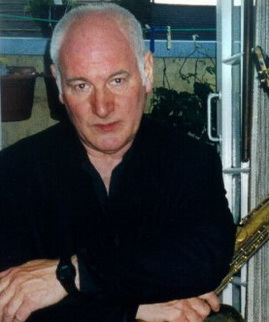
Stan Robinson was an English jazz tenor saxophonist and flautist.

Pitchin Can is an album by jazz saxophonist Archie Shepp recorded in Paris, France, in 1969 and 1970 for the America label. The album features one track by Shepp with Clifford Thornton, Noah Howard, Julio Finn, Leroy Jenkins, Dave Burrell, Earl Freeman, Sunny Murray and Chicago Beau and one extended track by Shepp with Thornton, Lester Bowie, Alan Shorter, Bobby Few, Bob Reid, Muhammad Ali, Djibrill and Ostaine Blue Warner.
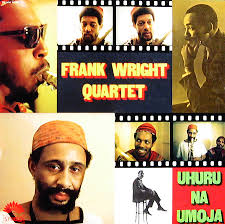
Uhuru na Umoja is an album by American free jazz saxophonist Frank Wright recorded in 1970 in Paris, originally released on the French America label and reissued on CD in 2004 by Universal France. Wright leads a quartet featuring alto saxophonist Noah Howard, who composed each of the tracks, pianist Bobby Few and bebop drummer Art Taylor in his first free jazz date. "Oriental Mood" and "Aurora Borealis" are the same compositions as "Mount Fuji" and "Queen Anne", from Howard's The Black Ark album.
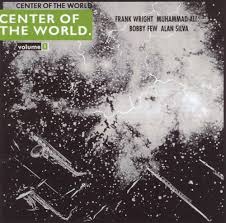
Center of the World is an album by the Frank Wright Quartet, consisting of saxophonist Frank Wright, pianist Bobby Few, bassist Alan Silva and drummer Muhammad Ali. It was recorded live in 1972 and released on the French Center of the World label. The album was reissued on CD in 1999 by Fractal with two previously unreleased performances from a 1978 reunion.

Last Polka in Nancy? is the second album by the free jazz quartet Center of the World, consisting of saxophonist Frank Wright, pianist Bobby Few, bassist Alan Silva and drummer Muhammad Ali. It was recorded live in 1973 at the Nancy Jazz Pulsations Festival and released on the French Center of the World label. The album was reissued on CD in 1999 by Fractal with a previously unreleased performance from a 1978 reunion.

Big Chief is an album by American free jazz drummer Sunny Murray. It was recorded in Paris in January, 1969, and was originally released on the Pathé label later that year. In 2008, it was reissued on LP by Eremite Records. On the album, Murray is joined by flutist Becky Friend, saxophonists Ronnie Beer and Kenneth Terroade, trumpeter Bernard Vitet, violinist Alan Silva, pianist François Tusques, and bassist Beb Guérin. In addition, poet H. Le Roy Bibbs joins the group on one track.
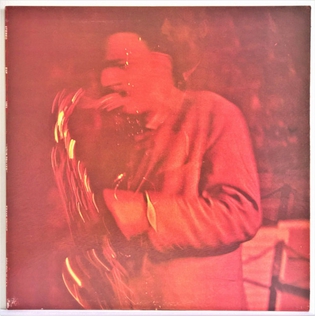
Your Prayer is the second album by saxophonist Frank Wright. It was recorded in May 1967 in New York City and was released by ESP-Disk later that year. On the album, Wright is joined by saxophonist Arthur Jones, trumpeter Jacques Coursil, bassist Steve Tintweiss, and drummer Muhammad Ali. The tracks were reissued in 2005 on the Frank Wright compilation The Complete ESP-Disk Recordings.
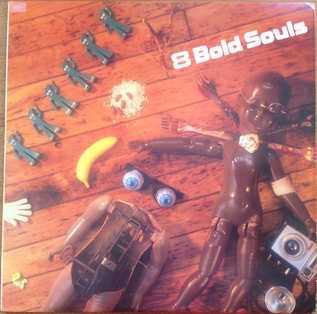
8 Bold Souls is the debut album by the jazz group of the same name. It was recorded in 1986 in Chicago, and was released in 1987 by Sessoms Records. The album features performances by saxophonist, clarinetist, and composer Edward Wilkerson, saxophonist Mwata Bowden, trumpeter Robert Griffin, Jr., trombonist Isaiah S. Jackson, Jr., tubist Aaron Dodd, cellist Naomi Millender, bassist Richard Jess Brown, Jr., and drummer Dushun Mosley.

The Complete ESP-Disk Recordings is a two-CD compilation album by saxophonist Frank Wright. Issued by ESP-Disk in 2005, it contains two studio albums released by the label during the 1960s: Frank Wright Trio, recorded in 1965 and issued in 1966, featuring bassist Henry Grimes and drummer Tom Price, and Your Prayer, recorded and released in 1967, featuring saxophone Arthur Jones, trumpeter Jacques Coursil, bassist Steve Tintweiss, and drummer Muhammad Ali. The compilation also features a twelve-part interview with Wright, conducted by ESP-Disk founder Bernard Stollman.

One for John is an album by saxophonist Frank Wright. Dedicated to Wright's mentor, John Coltrane, it was recorded at Studio Saravah in Paris on December 5, 1969, and was released in 1970 by BYG Records as part of their Actuel series. On the album, Wright is joined by saxophonist Noah Howard, pianist Bobby Few, and drummer Muhammad Ali.

Church Number Nine is an album by saxophonist Frank Wright. It was recorded in Paris on March 7, 1970, and was released in 1971 by Odeon Records in Japan. On the album, Wright is joined by saxophonist Noah Howard, pianist Bobby Few, and drummer Muhammad Ali. The French label Calumet reissued the album in 1973.

Sweet Space is a live album by the Billy Bang Sextet, led by violinist Bang, and featuring tenor saxophonist Frank Lowe, alto saxophonist Luther Thomas, cornetist Butch Morris, pianist Curtis Clark, double bassist Wilber Morris, and drummer Steve McCall. It was recorded on November 15, 1979, at the Loeb Student Center of New York University in New York City, and was released on vinyl later that year by Anima Productions. In 2004, the 8th Harmonic Breakdown label reissued the album on CD, with four alternate takes, along with Bang's 1982 release Untitled Gift on the compilation Sweet Space/Untitled Gift.

















